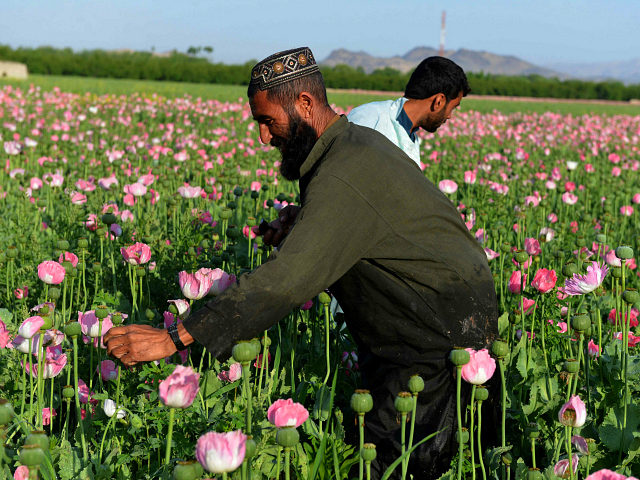The Trump administration’s unprecedented airstrike campaign against the Taliban’s top funding source, opium and heroin, may be driving the group to look for new ways to fund its terror operations in southern Afghanistan.
Voice of America (VOA) reports:
Taliban officials say they have established a new customs house in the Delaram district of southern Nimruz province in the southwestern part of Afghanistan.
The new effort to collect revenue follows joint Afghan-Coalition airstrikes on Taliban narcotics processing labs in the Helmand province last November. U.S-led coalition says such attacks will continue. A Taliban statement says it will begin collecting a transit tax in the southern Nimruz and southwestern Farah provinces on Jan. 13.
In a desperate move to fund its terror operations, the Taliban has resorted to various illegal means to make money, including kidnapping, extortion, as well as smuggling drugs, minerals, and precious stones, VOA learned from Afghan officials.
The Taliban is reportedly using the funds to buy weapons and intensify its offensive against the U.S.-backed Afghan National Defense and Security Forces (ANDSF), which include police and army units.
“They tax the transiting commercial vehicles and finance their insurgency in the southern Helmand and Farah provinces through this money,” Gul Bahar Mujahid, the police chief of Farah province, told Voice of America.
“[The Taliban] has repeatedly engaged in extortion and looting in the route of the Delaram and Khashrwod districts, and we are using military force to prevent their vicious actions,” added Khwaja Jelani Abu Bakr, the police chief of Nimruz.
In an apparent response to the pressure applied by the U.S.-backed efforts against the group’s opium operations, the terrorist group has reportedly set up its won checkpoints along major highways in southern Afghanistan.
“There is a Taliban checkpost after every Afghan security checkpost, you can see their white-color flag raised over the checkposts. … They tax commercial cars and trucks according to the sizes of the vehicle,” a local traveler identified only as “Ahmad” told VOA.
According to the U.S. military, the Taliban generates an estimated 60 percent of its funding from the illicit opium and heroin trade.
The United Nations has determined that Helmand is the top poppy-producing province in Afghanistan, the world’s top supplier of heroin’s main ingredient opium.
In a major departure from the previous administration, U.S. President Trump has authorized the American military to target the Taliban’s opium and heroin labs with airstrikes.
So far, the U.S. military has pulverized several labs used to process opium and its heroin derivative, dealing a multi-million dollar blow to the narco-jihadist group’s funding engine.
U.S.-backed ANDSF troops have also targeted other Taliban narcotic operations, including hashish trafficking.
“We believe that the Taliban, in some ways, have evolved into a criminal or narco-insurgency,” U.S. Gen. John Nicholson, the top commander of American and NATO troops in Afghanistan, declared in November. “They are fighting to defend their revenue streams. They have increasingly lost whatever ideological anchor they once had.”
“They fight to preserve and expand their sources of revenue. This includes narcotics trafficking, illegal mining, taxing people throughout Afghanistan, kidnapping, and murder-for-hire: all criminal endeavors,” he added, vowing to continue bombing the opium labs.

COMMENTS
Please let us know if you're having issues with commenting.